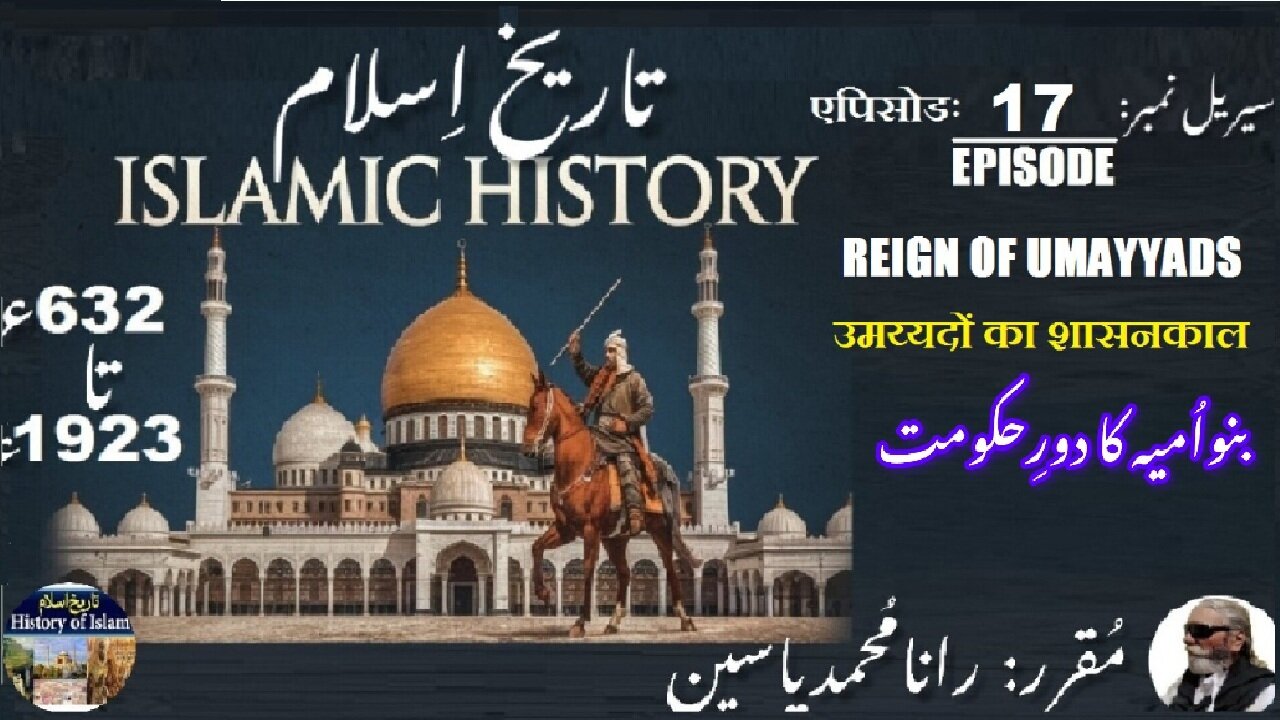Premium Only Content

Islamic History 632-1923,Episode-17-एपिसोड,Reign of Umayyads,उमय्यदों का शासनकाल,امویوں کا دور حکومت
@islamichistory813 #IslamicHistoryseries #Historical #Episodes #CulturalJourney
Islamic History 632-1923 |Episode-17-एपिसोड | Reign of Umayyads | उमय्यदों का शासनकाल | امویوں کا دور حکومت
Asslamoalaikum, sisters, brothers friends and elders,, we started this YouTube series delves on the subject Islamic history (632-1923), We are describing its evolution from after Death of Hazrat Mohammad (Peace be upon him) until Second World War untill last Sultan of Sultanate Osmanya. Each episode will provide a detailed information of significant events, cultural developments, and influential figures that shaped the Islamic world during this pivotal period. Please watch complete episodes as we are describing indetail of history of Islam that have contributed to the modern landscape of Islam.
After the death of Prophet Muhammad (peace be upon him) in 632 CE, the Muslim community was faced with the challenge of selecting a successor. Following the Prophet's guidance, the Ansar (supporters) and Muhajirun (migrants) gathered to elect Abu Bakr as the first Caliph. Abu Bakr's leadership ensured stability and continuity, and he successfully united the Arabian Peninsula under Islamic rule. Umar ibn Al-Khattab succeeded Abu Bakr and expanded the Islamic empire, conquering Syria, Palestine, and Egypt. Uthman ibn Affan, the third Caliph, oversaw further expansion, but his reign was marred by internal conflicts.
Hazarat Uthman's RA assassination (SHAHADET) led to the First Fitna, a civil war that resulted in Hazrat Ali ibn Abi Talib RA, the Prophet's cousin and son-in-law, becoming the fourth Caliph. However, Muawiyah ibn Abu Sufyan, the governor of Syria, challenged Ali's authority, leading to a prolonged conflict. Ali's assassination in 661 CE marked the end of the Rashidun Caliphate. Muawiyah established the Umayyad Caliphate, with its capital in Damascus. The Umayyads expanded the empire, conquering North Africa, Spain, and Central Asia.
In 750 CE, the Abbasid Revolution overthrew the Umayyads, establishing a new caliphate with its capital in Baghdad. The Abbasids oversaw a golden age of Islamic civilization, marked by significant cultural, scientific, and philosophical achievements. Caliphs like Al-Mansur, Al-Mamun, and Al-Mu'tasim patronized scholars, translating Greek and Persian works into Arabic. The Abbasids also expanded the empire, conquering eastern Europe and establishing trade networks.
In 909 CE, the Fatimid Caliphate emerged in North Africa, challenging Abbasid authority. The Fatimids conquered Egypt and established Cairo as their capital. However, the Fatimids declined, and the Ayyubid dynasty took control. In 1291 CE, the Ottoman Empire, founded by Osman Bey, began its expansion. The Ottomans conquered much of the Middle East, North Africa, and Eastern Europe, establishing their capital in Istanbul.
In 1258 CE, the Mongols, led by Hulagu Khan, sacked Baghdad, marking the end of the Abbasid Caliphate. The Mongols devastated much of the Islamic world, destroying cities and institutions. However, the Mongols eventually converted to Islam, and their Ilkhanate dynasty patronized Islamic arts and culture.
Following the Umayyad conquest of Spain, Islamic civilization flourished in the Iberian Peninsula. Cities like Cordoba, Granada, and Seville became centers of learning and culture. Scholars like Ibn Rushd (Averroes) and Ibn Arabi made significant contributions to philosophy, medicine, and astronomy.
The Crusades, launched by European Christians, aimed to reclaim the Holy Land from Muslim rule. The Crusades resulted in significant bloodshed and destruction. Muslim leaders like Saladin and Baybars led successful counter-attacks, recapturing Jerusalem and defeating the Crusaders.
In 1526 CE, Babur founded the Mughal Empire in India, which became a center of Islamic culture and learning. The Safavid dynasty, established by Shah Ismail in 1501 CE, unified Persia (modern-day Iran) under Shia Islam.
The rise of European colonial powers led to the decline of Islamic empires. The Ottoman Empire faced significant challenges, including the loss of territories and influence. The British East India Company conquered India, ending Mughal rule. The Safavid dynasty was eventually replaced by the Qajar dynasty.
During World War II, many Muslim-majority countries were colonized or occupied by Axis or Allied powers. The war weakened colonial powers, paving the way for decolonization.
Allah Hafiz
-
 LIVE
LIVE
SIEFE
1 hour agoRED DEAD REDEMPTION 2 LIVE!
433 watching -
 LIVE
LIVE
Film Threat
14 hours agoWOLF MAN + PETER PAN'S NEVERLAND NIGHTMARE + MORE GORE! | Film Threat Livecast
284 watching -
 34:28
34:28
Tudor Dixon
3 hours agoHypocrisy and Accountability in Politics with Sen. Markwayne Mullin | The Tudor Dixon Podcast
1.08K3 -
 LIVE
LIVE
The Shannon Joy Show
3 hours ago🔥🔥Live EXCLUSIVE With Edward Dowd: Trump CANNOT Stop The Worldwide Economic Collapse🔥🔥
605 watching -
 1:03:32
1:03:32
The Dan Bongino Show
3 hours agoTrump Joins The Show To Drop Massive Truth Bombs (Ep. 2403) - 01/17/2025
483K974 -
 LIVE
LIVE
Right Side Broadcasting Network
4 days agoLIVE: RSBN Pre-Inauguration Coverage: Day Two Live from Washington D.C. - 1/17/25
2,692 watching -
 21:42
21:42
The Rubin Report
2 hours ago‘Piers Morgan’ Panelists' Jaws Drop as Liberal’s Entire Narrative Obliterated w/ One Question
44.4K28 -
 1:37:57
1:37:57
Steven Crowder
4 hours agoMAGA: T-Minus Three Days | Everything We Want President Trump to do on Day One
227K78 -
 1:14:04
1:14:04
Dave Portnoy
19 hours agoThe Unnamed Show With Dave Portnoy, Kirk Minihane, Ryan Whitney - Episode 42
48.5K5 -
 LIVE
LIVE
LFA TV
17 hours agoREBUILD PEDOWOOD! | LIVE FROM AMERICA 1.17.25 11am
4,808 watching